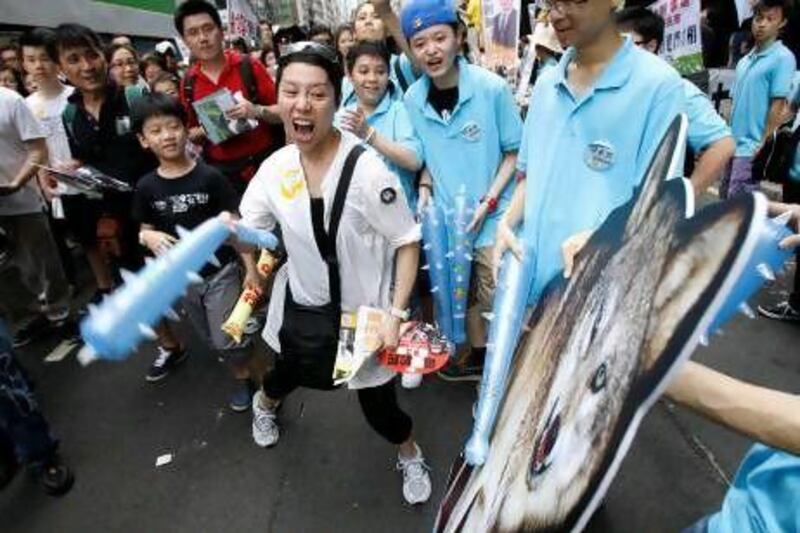HONG KONG // Chinese President Hu Jintao yesterday swore in Hong Kong's new leader while calling on him to resolve "deep disagreements" ranging from recent government scandals and political discord in the free-wheeling financial centre after a year of transition.
Security was tight at the same harbour-front venue where the British handed Hong Kong back to Communist Party-run China exactly 15 years ago, with hundreds of police forming a solid ring fence to ensure the isolated demonstrations were kept out of sight and earshot.
Mr Hu expressed China's confidence in Hong Kong's role as a free, law-abiding society, though in a sign of Beijing's anxiety over recent tensions, he appealed for unity and called on the administration of Leung Chun-ying, who was sworn in for a five-year term, to heed the recent social schisms.
"While we recognise Hong Kong's achievements 15 years after the handover, we must also be conscious of the deep disagreements and problems in Hong Kong society," Mr Hu said.
A lone protester stood and heckled Mr Hu as he spoke, demanding an end dictatorship in China, before being wrestled away by nearly 10 security personnel. Outside the venue, Hong Kong police and high barricades smothered all attempts by protesters to approach. Several demonstrators were taken away in a police van while a truck draped with black June 4 slogans denouncing Beijing's bloody crackdown on protesters in 1989 was forced away and tailed by a police motorcycle.
"Hong Kong has freedoms, and we have the right to protest. Why do you even stop us from walking?" lawmaker Lee Cheuk-yan shouted into a loud hailer as he harangued police blocking him.
Hong Kong is a liberal financial hub agitating for full democracy, making it both an asset and a potentially dangerous precedent for China where people are becoming increasingly intolerant of rights abuses and curtailed freedoms.
More than 100,000 Hong Kong citizens later hit the streets in an annual mass July 1 protest, sending a defiant message to Mr Hu and calling for unfettered democracy in 2017. "Hong Kong's human-rights record has backtracked," said one of the demonstrators, Theresa Cheng, a 20 year-old university student. "Freedom of speech is shrinking and reporters are facing more obstacles."
Other issues stoking citizen anger include an illegal construction scandal that has badly hit Mr Leung's reputation, a yawning wealth gap, corruption and pollution - though yesterday's events were held under a sunny blue sky.
Praised as one of the world's freest low-tax havens for conducting business and a gateway to China, Hong Kong has nevertheless struggled over the past 15 years, with critics accusing Beijing of extensive behind-the-scenes meddling.
This year saw a mud-slinging electoral race for the city's top job that was eventually won by Mr Leung, who now faces a damaging scandal over illegal constructions in a luxury villa that has corroded public trust, an infraction that had earlier torpedoed the chances of his election rival, tycoon Henry Tang.
Hong Kong's wealth gap has also widened to its worst level since the handover - while air pollution, high property prices, and anti-corruption probes into former and current senior officials' links to tycoons have stoked public frustration and tarnished the city's reputation for clean governance.
"Clearly there has developed an over-cosy, even incestuous relationship between top officials and big business," said Regina Ip, a lawmaker and former senior government official.
China again proffered a raft of economic goodies on Hong Kong to coincide with Mr Hu's visit - it said it would experiment with service-sector reforms in a new business zone next door in Shenzhen's Qianhai as a "mini Hong Kong" to consolidate Hong Kong's economic prospects. But public "negative" feelings towards the Chinese government are at a record high, according to a recent University of Hong Kong poll.
The gulf in freedoms between Hong Kong and China remains stark, with some residents taken aback by images of Mr Hu at a military parade at a Hong Kong People's Liberation Army barracks on Friday as thousands of soldiers, assembled before tanks and defence hardware, hailed their leader.






